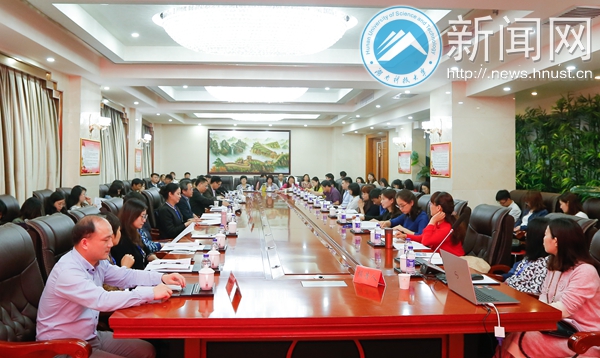On May 18th, the Seminar on Corpus Research in the New Era jointly hosted by the School of Foreign Studies and the Department of Social Sciences was successfully held at the Huayin International Hotel. Professor Zhang Jinghua, Dean of the School of Foreign Studies of HNUST, presided over the opening ceremony.
The seminar was guided by Foreign Language Teaching and Research, an authoritative academic journal of foreign languages with nearly 70 participants of experts and scholars from more than 20 universities and research institutes such as Beijing Foreign Studies University, Communication University of China, Nanjing University and Macao University.
Professor Liu Youjin, the vice president of HNUST, first introduced the history and schooling characteristics of HNUST and the School of Foreign Studies, then expressed his gratitude to the experts and scholars for their support for the school's academic development and discipline construction.
Six professors delivered wonderful speeches at the seminar. Among them, Professor Wang Kefei, the editor-in-chief of Foreign Language Teaching and Research, made a macroscopic interpretation of the multilingual corpus themed on “Corpus Research and Development” from 5 different aspects such as corpus construction, language research and translation studies, which played a guiding role in the overall development and the direction of corpus research.
Moreover, Professor Wang said it was a great honor to have a detailed discussion there with all these experts and scholars throughout the country about the corpus linguistics research, and he hoped that everyone could share their opinions to gain new understanding and to promote relevant research.
Professor Liang Maocheng from Beihang University gave a speech with the theme of “Deep Learning Technology and Language Research” in which he explained how to integrate vectors into Artificial Neural Networks for corpus operations in different ways from language sequence to sequence modeling. He pointed out that it's necessary to properly treat the increasing number of big language data, update corpus analysis methods, and consider the way to deeply integrate language research with artificial intelligence.
Professor Hou Min from Communication University of China, with “Research of Alphabetic Words Based on Corpus” as the theme, demonstrated the usage and development rules of alphabetic words in Chinese, and pointed out that we should review the usage of Chinese alphabetic words against the backdrop of networking, informatization and international integration as well as China’s efforts of shaping the image of a major power, because alphabetic words have been reflecting the features of times.
Professor Ge Lingling from University of South China, with “Translation Studies of Verbal Humor Based on the Chinese-English Parallel Diachronic Corpus” as the theme, expounded the extension theory of the verbal humor generality and development of the Chinese-English parallel diachronic corpus from six parameters of the generation and understanding of verbal humor.
Professor Li Defeng from University of Macau, with “The Meaning-attribution and Thick Description in the Studies of Translators Style in Corpus” as the theme, underlined the importance of corpus data analysis, and illustrated the significance of meaning-attribution and thick description in two translation styles.
Doctor Yang Jiang of HNUST, under the theme of “metrological study of cross-language in the syntactic level based on the corpus”, expounded the average depth of syntactic level in different sentences calculated among over 5 million phrase structures in five languages of English, Germany, Portuguese, Chinese and Japanese.
In the penal presentations, participants carried out heated discussions centered on such issues as “corpus and the construction of Chinese discourse system”, “corpus and the studies of language acquisition and language teaching”, “corpus and cross-language and cross-culture studies”.
It was reported that the seminar was held against the new backdrop of China implementing language strategies in the age of Big Data. Therefore, based on the research methods and techniques of innovating corpus, it strengthened the integration of corpus-based methods with linguistics and Artificial Intelligence (AI) and promoted interdisciplinary research. The academic exchanges provided an opportunity for Chinese scholars engaging in corpus research, to display the current trend of cutting-edge corpus study, thus advanced the sustainable development of Chinese corpus research.
(Translated by Hu Pan, Chen Meijun)
